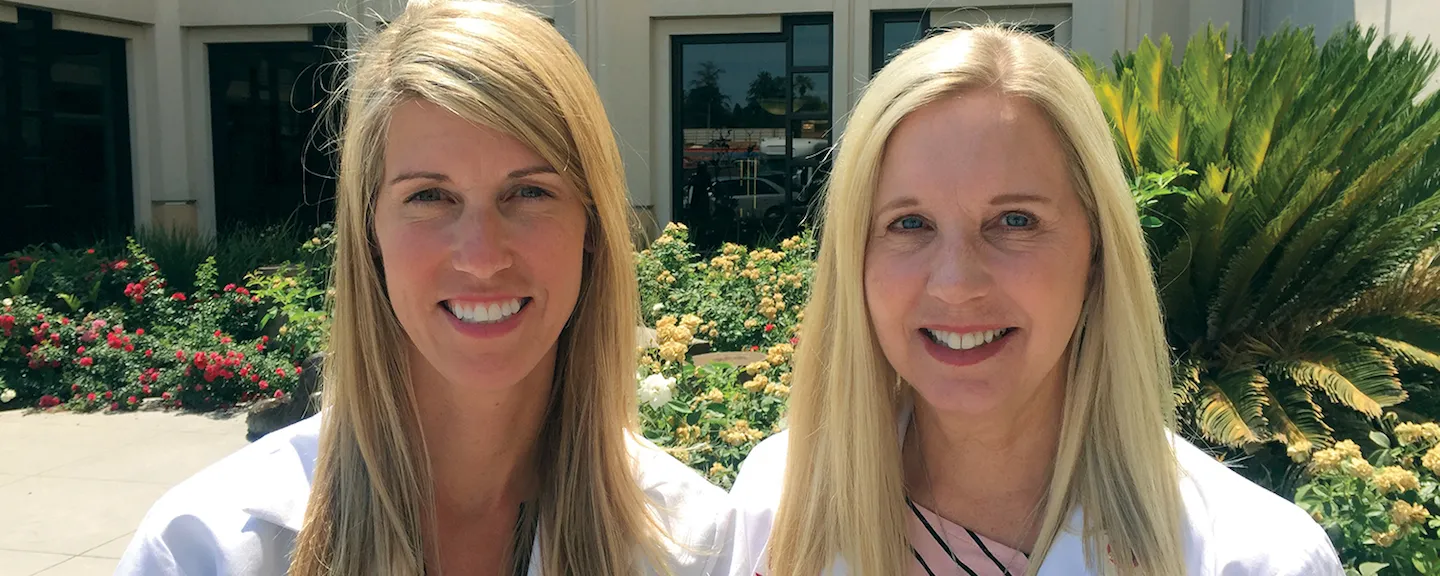- Home
- >
- APU Articles
- >
- News Article
Matters of the Heart
January 29, 2018 | Written By Caitlin Gipson

“Transition between pediatric and adult health care for this population has become extremely fragmented,” said Jen Newcombe, MSN ’04, DNP ’16, adjunct nursing professor at APU. “Patients can become lost in the healthcare system as they age out of their parents’ insurance and the hands-on pediatric medical establishment. Navigating the healthcare system to find adult practice doctors that understand congenital conditions can pose a challenge. As a result, adult patients with congenital heart disease often show up in the emergency room with issues that could have been prevented with proper care.” To address this growing problem, Newcombe spearheaded a business proposal to start an adult congenital heart disease center at Loma Linda, and she teamed up with fellow APU alumna and adjunct nursing professor Cindy Glasgow, MSN ’04, to make it happen.
Loma Linda’s Adult Congenital Heart Disease Clinic opened its doors in June 2015 and began a unique collaboration. As a pediatric nurse practitioner, Newcombe cares for children with congenital heart disease from birth to 17. Glasgow, a family nurse practitioner, runs the clinic that continues their care at age 18 and beyond. Together, they ensure that Loma Linda’s heart patients receive the long-term care they need, and that the next generation of APU nursing students graduates with the ability to navigate this distinct specialty.
Caring for aging pediatric heart patients presents many challenges for patients, their families, and the medical system. “Heart disease is not curative,” Newcombe said. “You don’t just have a surgery, take medicine, and live your life normally. Rather, it’s palliative. Congenital heart patients deal with different aspects of their disease throughout their lives.”
This means that patients must learn to become their own health advocates as they age—a prospect that often daunts patients and their parents. “Parents are accustomed to managing all aspects of their child’s complicated medical care from infancy, which means they often struggle with letting go,” said Newcombe. She and Glasgow discovered that children can grow into their teenage years without fully understanding their own medical history.
Thus, the transition begins with Glasgow sitting down with them and their charts and explaining past procedures in detail. “I spend hours answering questions and drawing diagrams,” Glasgow said. “Understanding their own condition is the first step to becoming responsible for their own care. Becoming their own advocate is a major rite of passage.” The clinic also helps patients begin to navigate the ever-changing insurance landscape. “These kids are born with a preexisting condition that makes it difficult to obtain insurance once they become adults, so we specialize in helping them find insurance options so that they can receive the ongoing care and procedures they need.”
Likewise, the transfer from a pediatric cardiologist to an adult cardiologist represents one of many relational and emotional hurdles these patients face. “Our patients have usually had the same cardiologist for 18 years, and there is a lot of trust built there,” Glasgow said. “Transitioning to a new doctor can be an emotional process.” To aid this transition, she and Newcombe begin introducing the new practitioner early in the process. Connecting patients with an adult cardiologist who understands the issues surrounding congenital heart disease closes a major gap in patient care. “The adult medical establishment isn’t always prepared for these patients,” Glasgow said. “When they go into the hospital for other, normal medical issues, their heart becomes a complicating factor. They may only have half a heart, or a major conduit has been rerouted to a different side of their heart to function as both left and right. Under normal circumstances, most doctors and nurses will not expect that.”
Glasgow tells the story of one adult congenital heart patient who had become pregnant. “Her doctor told her that she had to abort the baby because pregnancy puts such a strain on the heart,” she said. “But she desperately wanted a family. This population has never grown old enough for pregnancy to be an issue, so no one knew if it would be successful. Instead, she came to our clinic, and we walked with her through her pregnancy. Today, she has a healthy one-year-old boy.”
For Newcombe and Glasgow, success stories like this one fuel their passion and affirm their purpose as they pass on their knowledge of this subspecialty to APU nursing students. “My graduate work at APU set me up for success with professors that focused on developing me as a whole person,” said Newcombe. “It’s an honor for us to do the same for our students. We have been asked to teach at Loma Linda, but we both feel committed to APU because of the excellent education we received and the opportunity to give back.”
With Loma Linda’s Adult Congenital Heart Disease Clinic leading the way, and professors such as Newcombe and Glasgow training the next generation of nurses at APU, today’s adult cardiology patients can look forward to a brighter, healthier future.